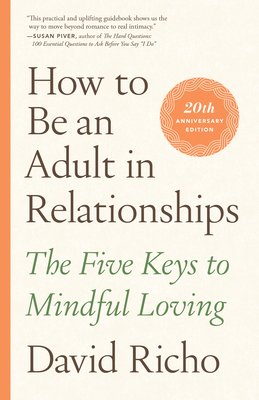



Psychological and spiritual adulthood does not come automatically with age. It requires ongoing and ardent work on ourselves. It involves articulating our own truth and acting in accord with its challenges.
In this best-selling work, David Richo provides a hand-book for achieving psychological and spiritual health. Based on his many years' experience as a psychotherapist and workshop leader, the author uses the metaphor of the heroic journey, whose three phases--departure, struggle, and return--explain what happens in us as we evolve from neurotic ego through healthy ego to the spiritual self. First, he discusses the three challenges to adulthood: fear, anger, and guilt, as well as the self-esteem that comes from meeting those challenges. Then he discusses the dual problem of maintaining personal boundaries and establishing appropriate intimacy. Finally, he discusses the techniques of integration and the return to wholeness and love.
How to Be an Adult is a thoughtful, accessible guide filled with useful quotations and reflections for meditation, as well as other techniques and concrete advice on the process of growth. The new appendix provides readers with practical ways to show integrity and loving-kindness.
David Richo, PhD, is a psychotherapist, teacher, and retreat leader in Santa Barbara and San Francisco, California. He is the author of many books and emphasizes spiritual perspectives in all his work. His website is www.davericho.com.
+











Another masterful work by this renowned and popular author, Wholeness and Holiness guides the reader through grace into the possibilities of a deeper spirituality and relationship with oneself, the world, and God. With his lifetime experience in psychology and spirituality, David Richo takes us on a three-step journey to become psychologically healthy, spiritually aware and active, and sometimes saintly. All three are possible

Everyone is afraid. Sometimes fear is inappropriate and unnecessary. At other times, we have good reason to be afraid. But in every case, fear reduces our ability to be ourselves. It convinces us we shouldn't take chances or risks.
This book is for people who want to let go of unreasonable fear or act more creatively in the face of reasonable fear. It explores the roots of fear--the fear of change, of self-disclosure, of giving and receiving, of being alone. Beneath all of these is the greatest fear of all: the fear of loving and being loved. This 25th anniversary edition speaks of the enduring message of the book and this new edition has been greatly updated and expanded to include more contemporary developments in psychology and current events. Every chapter of the book has been rewritten and revised with a new audience in mind. Some new sections have been added and existing sections revised. This revised and updated edition reflects the author's growing understanding of the ageless concern in our lives--becoming free from fear so that we can be more resourceful in our life.
Richo has chosen twenty-three components of humanness, each a topic of a chapter. He begins each chapter with a short section about the topic as it is described in psychology or spirituality. Then he presents quotations from Shakespeare on that theme. Every passage walks us into who we are and can be, both psychologically and spiritually. The quotations are wonderfully imaginative kick-offs into it. After each Shakespeare quotation is a short re-phrase in modern English. After each set of quotations, he presents a paragraph or two, based on the points made in them, meant to show how they can be springboards into becoming more sensitive to the topic.
The book is divided into three parts. In Part One, the author explores who we are. In Part Two, he looks at what happens to us during a lifetime. In Part Three, he presents specific suggestions found in Shakespeare about how to put these themes into practice.




